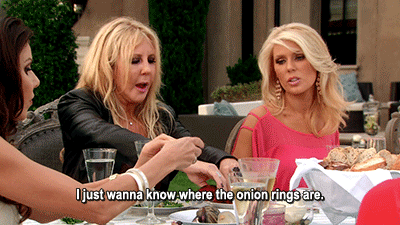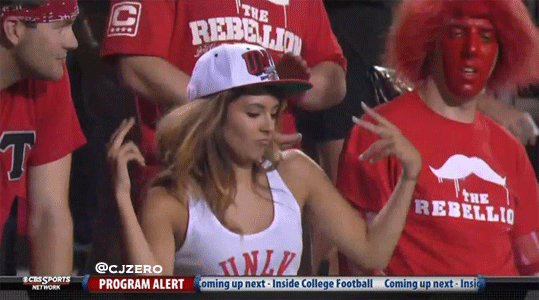I was halfway through explaining some of my qualifications to my two male interviewers when one of them began to laugh. "Have you ever held a real position before?" His tone of voice was not joking; he was sneering at me.
I calmly explained that, yes, I had held several full-time positions in the past, including two summer positions. One of the positions was expected to last a summer, because it was a project-based need paid for by a grant to the company. The second was at a startup and was expected to last indefinitely, but businesses don't always succeed in their financial goals.
This was not the first time during the interview that either of my two male interviwers looked down on me—for being a woman or being young, I'm not sure, but it was most likely a combination of both. I'd gotten laughed at during one of my open-ended questions on a piece of news I would share with online followers, because I'd picked Google's new logo. I'd also been smirked at while talking about the technology that I know, and the graphic design and video software I'm familiar with. At the end of the interview, I'd been told I would have forty-five minutes to complete an assessment that should take me "about three hours total." I completed it thoroughly in twenty minutes.
![]()
After an interview where I felt neither of the interviewers respected me whatsoever, I was absolutely shocked to get an email a week later with a job offer letter attached. The offer letter stated my salary, my proposed start date, my benefits package and the location of the office.
My first thought? To call the person sending me the offer (in this case, the owner of the company) and negotiate salary and benefits. After all, I had held full-time positions before. I knew how this worked.
After some research and careful thought, I had a number in mind to suggest. I knew that I should always start higher, because it was likely the counter-offer would be in the middle. I had several negotiations I wanted in terms of the benefits package and start date, as well.
When the owner picked up, I started discussing the negotiation. As nervous as I was, I jumped into it, talking about the research I'd done on salaries for this position in the geographic area, combined with my skills and experience, combined with the responsibilities of the job (I'd be managing other employees).
At the end of what I had to say, the owner almost, albeit virtually, laughed in my face. He said that I'd be gaining experience from this position—as if my other positions still didn't count as "real work"—and that there were benefits to the job beyond just the salary and the benefits. Down the line, he said, I might get to develop a women's magazine and focus on women's issues.
This job was in the field I'm interested in: Publishing and digital media. This field is literally what I'm getting my Master's degree in, at a well-respected college in the creative arts. The position paid a livable salary and was easily accessible on the train line from my apartment. For about ten minutes, I seriously considered sucking it up and taking the job.
This could be my stepping-stone into publishing, I told myself. Imagine all the opportunities this will open up.
Then, I imagined what my day-to-day would be like. One of the two interviewers, the one who I felt disrespected me most, would be my immediate supervisor. The other was the owner of the company, who went on to insinuate that I should take a job without negotiating my salary and benefits, not because there was a union or a budget for the company, but because I could "learn so much" and maybe "start a women's magazine" under the company umbrella someday. (Afterward, I seriously regretted how I'd put on my application that I was taking a graduate-level course in "Launching a Women's Magazine or Website," which I'd thought would be a plus for managing a burgeoning multimedia publisher.)
I imagined being laughed at when I brought ideas to the table for publication. Or having my editorial judgment and feedback looked down upon because of my gender. I imagined my supervisors and co-workers staring at my appearance with a careful eye, ready to strike if I dared wear something 'inappropriate.' I thought about how hard I'd have to work not to let my inner feminist come out, given that being a feminist is central to who I am. Most importantly, I thought about how dangerous it is to be in a toxic workplace environment, one where I'm not even given basic respect because of an attribute I can't change about myself.
And I turned the job down.
Was it the right decision? In today's economy, even for those with bachelor's degrees who are working on a master's degree, I have no idea. But that's what I did. I thought about my own physical and emotional safety, and imagined being in a company culture forty hours per week that didn't respect me on a basic human level. And I thought to myself, "This isn't what I'm studying so hard for. This isn't what I did three co-ops, many freelance and part-time professional positions, and two full-time positions for. This isn't what I'm getting a graduate degree for. I deserve more than this."
As a woman, I already feel bad saying I deserve anything. That's what our culture has been conditioned to believe. Women make less money than their male counterparts who do the same job. Even in publishing, the field I've come to know and love, women make up most of the workforce—except at the senior management level. We're never able to advance that far in our careers, because institutionalized sexism holds us back.
In a workplace where I wouldn't be accepted as a woman, I was worried I'd never be accepted as a queer woman with a sensory disability. It's that kind of intersectional sexism that worries me most. I knew I wouldn't be respected already, because of my gender, so there was no hope for my supervisors or my colleagues to see the full picture and still treat me like a human being. I'm a gay, disabled woman. And yes, I can do the job. My sensory disability prevents me from some tasks, like walking on a balance beam, riding a bicycle, and following driving directions without a GPS, but I'm very experienced in the worlds of editing and publishing, and I chose this field because I excel at it. And my being queer changes nothing about my digital media abilities. But I knew in advance it wasn't likely this would be visible in my potential workplace. All they would see was a negative stereotype, and I would never move beyond that.
Every time after this that I was turned down for a job I wanted, I cursed myself. "I could be working at that sexist media company," I'd think, "if I had only sucked it up." I felt I was fated not to get a job because I'd had a basic level of respect to turn down a potentially toxic one. Among my friends, who'd recently graduated with bachelor's, how hard the job market is was a hot topic. I could feel my cheeks turning pink whenever the subject came up. There's Alaina, I imagined others saying, as my friends lamented on the job offers they never received. She got a job offer in her field with a living wage that she could have taken, but didn't.
![]()
This isn't okay. The fact that women, and young women who are recent graduates especially, feel like we have to suck up, impress interviewers and be pleasant in the face of utter sexism is toxic and dehumanizing. Throughout my interview, I was cordial. I was impressive. As my interviewers laughed in my face at my answers and refused to look me in the eye, I was expected to be more than just professional, but to actually go out of my way to wow them. They laughed at my so-called "lack of experience" and instead of correcting them and walking out with my dignity, I played along. This is what institutionalized sexism taught me to do: To try and try again, even if the person clearly doesn't respect me.
It's obvious to me that we need a serious overhaul in the management of businesses. In 2015, I never expected to enter a job interview and leave with such a completely, exhaustively gross feeling. It was so foreign to me that I almost couldn't name it. I'd been the subject of sexism before, of course, but it was mostly outside of professional workplace settings. I'd been lucky. I'd never been harassed or talked down to on the job, only respected for my skills and ideas. When it finally happened, it took me months to put a name to it, to say out loud to myself and others why I'd turned down that particular job: The interviewers were sexist. My boss would have been sexist. The owner was sexist.
If we don't have an overhaul soon, this problem will only worsen. As I said earlier, I'm not just a woman, I'm marginalized in other ways. And I know how typically non-diverse publishing is, because the same studies that point to women's lack of management roles also started an uproar about the lack of diversity on publishing staff. I want to feel safe, equal and respected entering my workplace of choice as a queer, disabled woman. I'm a qualified candidate, and that's what matters, not those other labels that should be left in my personal life unless I choose to bring them up.
We need to do a thorough job of putting in place the ideas we all talk about constantly. Women should be paid equally. Women should be in positions of power. People of color of both genders should be paid equally, and put in positions of power. We need to diversify the publishing industry (all industries, really) to include LGBTQIA people, people of color, disabled people, and ethnic and religious minorities, on all levels, from entry level up to senior staff. We talk the talk all the time, and studies are released. But we need to keep the uproar going until this change becomes an overhaul that the workforce cannot ignore.
I want my story to be the last of its kind. I know it already isn't, and it won't be for a while. But I hope that someday, people read this as a relic of a sexist, homophobic, ableist past that they can no longer imagine. I hope it serves as part of a larger conversation that something needs to change. And it has to change now.



































































